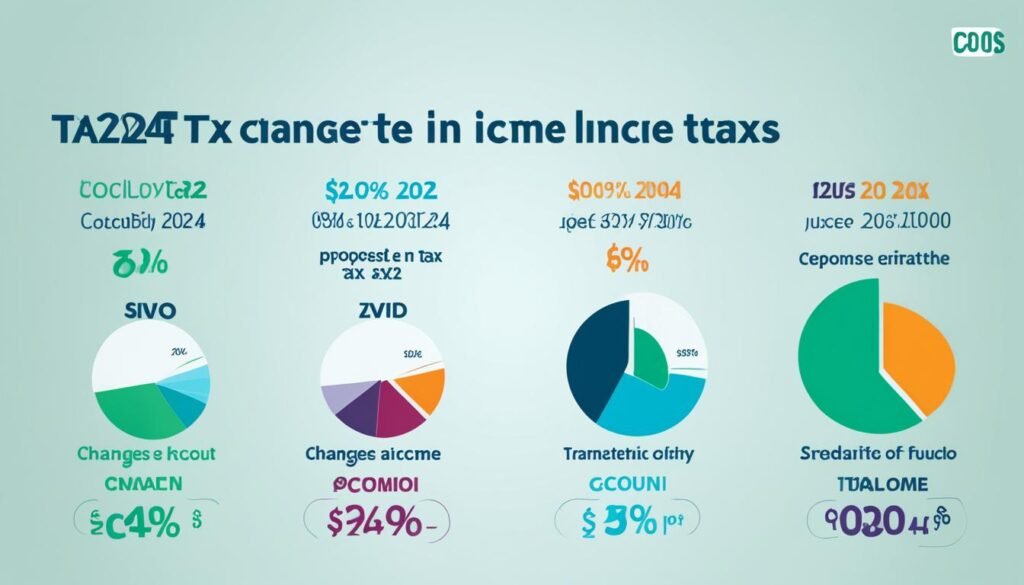The Indian Budget 2024 has brought big changes in income tax Act. Finance Minister Nirmala Sitharaman has made the tax system friendlier for taxpayers. She aimed to help salaried workers, professionals, and the middle class.
These changes include new income tax brackets, higher standard deduction limits, and updates on capital gains tax. They also aim to make the tax system simpler and easier to follow.
Key Takeaways
- Increase in standard deduction from Rs 50,000 to Rs 75,000 effective from AY 2025-26
- Enhanced deduction for employer’s NPS contribution from 10% to 14% for those opting for the new tax regime
- Hike in short-term capital gains tax rate on equity-oriented mutual funds and shares from 15% to 20%
- Increase in long-term capital gains tax rate from 10% to 12.5% on financial and non-financial assets
- Withdrawal of shares buy-back exemption for shareholders, treating it as deemed dividend
Introduction
The Indian Budget 2024, presented by Finance Minister Nirmala Sitharaman, brought big changes in income tax. These changes will deeply affect personal finance for Indian taxpayers. The budget aims to make the tax system simpler, increase deductions and exemptions, and change tax rates. This will help salaried individuals, professionals, and the middle class.
Overview of the Indian Budget’s Impact on Personal Finance
The main changes in the Indian Budget 2024 that will affect personal finance are:
- Revisions to income tax slabs under the new tax regime
- Hike in standard deduction limits
- Changes in capital gains taxation
- New TDS (Tax Deducted at Source) rates
- Various other measures to improve tax compliance and convenience for taxpayers
These changes aim to make the tax system simpler, increase deductions and exemptions, and help salaried individuals, professionals, and the middle class. They will improve the overall indian budget 2024 personal finance situation for Indian taxpayers.

New Income Tax Slabs under the New Tax Regime
The Indian budget 2024 has made big changes to income tax slabs. These changes aim to make the tax system simpler and help taxpayers in various income groups.
| Income Range | Tax Rate |
|---|---|
| ₹0 – ₹3 lakh | 0% |
| ₹3 lakh – ₹7 lakh | 5% |
| ₹7 lakh – ₹10 lakh | 10% |
| ₹10 lakh – ₹12 lakh | 15% |
| ₹12 lakh – ₹15 lakh | 20% |
| Above ₹15 lakh | 30% |
The new tax slab structure makes taxes easier by cutting down on the number of slabs. Now, people earning up to ₹7.75 lakh a year don’t have to pay taxes. This brings big relief to the middle class.
The new income tax slabs 2024 and the simplified tax structure under the new tax regime are meant to get more people to choose the new tax regime. This regime offers a clear way to manage personal finance and taxes.

Hike in Standard Deduction Limits
The budget 2024 has brought big changes for salaried employees and pensioners. One major change is the increase in the standard deduction. It now goes from ₹50,000 to ₹75,000. This means more money in the pockets of those choosing the new tax rules.
For pensioners, the budget has also made a big move. The deduction for family pension income has jumped from ₹15,000 to ₹20,000 or one-third of the pension, whichever is less. This is to give more tax relief to senior citizens and retirees.
Increased Deductions for Salaried and Pensioners
This increase in the standard deduction could save salaried employees up to ₹17,500 in taxes. It’s expected to help around four crore salaried individuals and pensioners. This shows the government’s effort to improve the financial health of workers and retirees.
Also, the budget has raised the employers’ deduction for the New Pension Scheme (NPS) from 10% to 14%. This encourages more private sector employees to join the NPS and plan for their retirement.
| Tax Benefit | Previous Limit | New Limit |
|---|---|---|
| Standard Deduction for Salaried Employees | ₹50,000 | ₹75,000 |
| Deduction on Family Pension Income | ₹15,000 | ₹20,000 or 1/3 of pension, whichever is lower |
| Employer’s NPS Contribution for Private Sector | 10% | 14% |
These changes in income tax are aimed at giving more tax relief to salaried employees and pensioners. They aim to boost their financial well-being and increase their disposable income.
Key Changes in Income Tax in the Indian Budget
The Indian Budget 2024 brought big changes to income tax. These include new tax rates, more deductions, changes in capital gains, and ways to make tax easier and reduce disputes. The main points about budget 2024 on personal taxes are:
- New tax rates from 0% to 30% for different income levels.
- Standard deduction for salaried people went up from Rs. 50,000 to Rs. 75,000.
- Family pension income deduction limit increased from Rs. 15,000 to Rs. 25,000.
- Capital gains tax changes include a 5% increase in tax for short-term gains on shares, funds, and business trusts. Long-term gains now have a Rs. 1.25 lakh exemption limit, up from Rs. 1 lakh.
- TDS rates cut for payments like insurance commissions and rent from 5% to 2%. This helps businesses and makes following the rules easier.
- Higher limits for filing tax disputes at different courts to reduce legal battles.
- Review of the Income Tax Act to make it clearer and cut down on disagreements.
These income tax changes in the Indian budget 2024 aim to ease taxes, simplify following the rules, and boost investment and growth.
Enhanced Deduction for Employer’s NPS Contribution
The Indian Budget 2024 has brought a big change. It will help both employers and employees. The limit for what employers can put into the National Pension Scheme (NPS) has gone up. It now covers 14% of what employees earn and their dearness allowance, up from 10% before.
This change is for private sector workers who choose the new tax rules. It aims to get more people to join the NPS. This way, they can save more for their future.
Now, employers can put up to 14% of an employee’s salary and dearness allowance into their NPS. This is seen as a ‘Business Expense’. It can be deducted from the company’s profits under section 36(1)(iv)(a) of the Income Tax Act, 1961.
Employees also gain from this, as they can get tax breaks on what employers put into their NPS. This is up to 10% of their wages, no matter the tax regime. With the nps deduction increase and tax benefits for employer contribution to pension scheme, employees will see more money in their pockets because of lower taxes.
This change is good news for both employers and employees. It boosts retirement savings and offers tax perks for everyone.
Increase limit of Remuneration to the Partners and Applicability of TDS
The Indian Budget 2024 has made a big change in how we tax partner earnings in partnership firms, including Limited Liability Partnerships (LLPs). It has raised the limit for what partners can earn and introduced a new Tax Deducted at Source (TDS) rule.
The new rules set a higher limit for what partners can earn. Here are the details:
- On the first ₹6,00,000 of book profit or loss: ₹3,00,000 or 90% of book profit, whichever is higher.
- On the remaining balance of book profit: 60% of the book profit.
Also, a new TDS rule has been added under Section 194T. Now, partnership firms (including LLPs) must deduct 10% tax on payments to partners. This includes salary, remuneration, interest, bonus, or commission over ₹20,000 in a year. This change aims to make partner earnings clearer and more compliant with tax rules.
| Particulars | Old Limit | New Limit |
|---|---|---|
| Maximum Remuneration on first ₹3,00,000 of book profit/loss | ₹1,50,000 or 90% of book profit, whichever is higher | ₹3,00,000 or 90% of book profit, whichever is higher |
| Maximum Remuneration on remaining book profit | 60% of book profit | 60% of book profit |
| Maximum Interest on Partner’s Capital | 12% per annum | 12% per annum |
These changes will give partnership firms and their partners more flexibility and tax benefits. The new TDS rule will also make partner earnings clearer and more compliant with tax laws.
Revamp of Capital Gains Taxation
The Union Budget 2024 has brought big changes to how we tax capital gains. It made holding periods simpler and changed tax rates for short-term and long-term gains.
Simplified Holding Periods
Now, it’s easier to figure out if an asset is long-term or short-term. Securities listed on stock exchanges are long-term if held over 12 months. Other assets are long-term after 24 months.
Revised Tax Rates
The budget has also tweaked tax rates on capital gains:
- Long-term gains from stocks and equity funds now face a 12.5% tax rate, up from 10%. But, the tax-free amount has gone up to Rs. 1.25 lakh.
- Short-term gains from stocks and funds now face a 20% tax rate, up from 15%.
- For other long-term assets, the tax rate dropped to 12.5%, but the indexation benefit is gone.
These changes aim to make capital gains tax easier and align with the government’s tax goals.
New TDS (Tax Deducted at Source) Rates
The Indian budget 2024 has made changes to the TDS (Tax Deducted at Source) rates. These changes aim to make business easier and help with following tax rules. The new TDS rates will start either on October 1, 2024, or April 1, 2025, based on the payment type.
One big change is lowering the TDS rate on insurance commission, life insurance payments, lottery ticket sales, brokerage, and rent payments from 5% to 2%. This will help both businesses and people in these areas.
Also, the TDS rate on payments by e-commerce operators to participants is now 0.1%, down from 1%. This makes things easier for the e-commerce sector.
There’s also a plan to remove Section 194F on buying back mutual fund units. This will make tax rules simpler for mutual fund investors.
These new TDS rates, along with other tax deduction at source changes and compliance measures, aim to make the Indian tax system more efficient and easy to use.
Credit for Taxes Collected at Source (TCS)
The Indian Budget 2024 has brought in a big change. It helps salaried people who send their kids abroad for studies. Now, they can use Taxes Collected at Source (TCS) to reduce their Tax Deducted at Source (TDS).
This is great news for those who struggle with cash flow because of a 20% TCS on money sent over Rs. 7 lakh (about $8,400) for their families abroad. The new rules aim to ease this financial strain for individuals and NRI taxpayers.
The tcs credit against tds rule will greatly benefit taxpayers. It lets them use the TCS they paid to lower their tax bill. This will ease their financial load and help those with family members studying abroad.
Also, parents can now claim TCS credit if it was taken from their minor child’s income. This makes sure the tax help goes to the right people. It supports families with kids studying abroad financially.
The budget provisions for nri taxpayers on TCS credit against TDS are a big step. They offer tax relief for individuals. They also tackle the financial hurdles faced by Indian families with kids studying abroad.
Revision of STT (Securities Transaction Tax) Rate
The Indian Union Budget 2024 has made big changes to the Securities Transaction Tax (STT) rates. These changes will affect equity investors and the capital markets a lot. The STT on futures contracts has gone up from 0.0125% to 0.02%. The STT on options contracts has risen from 0.0625% to 0.1%.
These changes are part of the government’s plan to update the tax rules for the capital markets. The increase in STT aims to reduce excessive speculative trading, especially in derivatives. It also wants to push for a more long-term investment mindset among traders.
| Transaction Type | Old STT Rate | New STT Rate |
|---|---|---|
| Futures Contracts | 0.0125% | 0.02% |
| Options Contracts | 0.0625% | 0.1% |
| Delivery-based Equity Share Trades | 0.1% | 0.1% |
The rise in STT rates and the changes in capital gains taxation aim to balance long-term investment with short-term speculation. This strategy is expected to significantly affect the stt rate changes, the impact on equity investors, and the overall budget provisions for capital markets.
Relaxation in Penal Provisions
The Indian Budget 2024 has brought in changes to help with penalty relief and cut down on income tax lawsuits. These steps aim to make things easier for businesses and professionals. They aim to make the tax system more friendly to taxpayers.
De-criminalization of TDS Defaults
A big change is the de-criminalization of defaults in Tax Deducted at Source (TDS) payments. This was a big issue for many companies. Now, the budget has made things easier for them.
Businesses and professionals won’t face criminal charges for TDS defaults anymore. This change is expected to make things less stressful for them.
The budget also raised the limits for filing tax disputes in different courts. Now, the limits are Rs. 60 lakh, Rs. 1 crore, and Rs. 2 crore for each court level. This should help in reducing the number of pending tax cases.
It also makes it easier for taxpayers to solve their disputes. They can now settle their cases with a one-time payment, avoiding long legal fights.
These penalty relief measures, decriminalization of TDS defaults, and budget provisions to reduce litigation are meant to make the tax system more taxpayer-friendly. They aim to make tax compliance smoother for everyone in India.
Tax Relief for Indian Professionals
The Indian government’s 2024 budget has brought tax relief to salaried individuals and professionals. These changes aim to increase their disposable income and tax savings.
The standard deduction for salaried taxpayers has gone up from Rs. 50,000 to Rs. 75,000. This means those earning Rs. 20,00,000 could save up to Rs. 17,500 in taxes.
The budget also raised the deduction for family pension income to Rs. 20,000 from Rs. 15,000. This helps retirees and their dependents. Plus, the employer’s NPS contribution deduction increased from 10% to 14% of the salary. This is great news for retirement savings for professionals.
These tax benefits for professionals will help the salaried class and Indian professionals save more. They will have more money to spend and save.
The government is committed to supporting the salaried class and professionals in India. They are key to the country’s economic growth and development.
Increase in Monetary Limits for Appeals
The Indian budget 2024 has made big changes to the limits for filing tax dispute appeals. Now, you can file appeals up to Rs. 60 lakh in tax tribunals, Rs. 1 crore in high courts, and Rs. 2 crore in the Supreme Court. This change is expected to greatly reduce the backlog of tax cases and make tax litigation easier for taxpayers.
This increase in limits is part of the government’s plan to make tax disputes easier to resolve. It aims to give relief to businesses and individuals. By setting higher limits, the budget encourages more people to seek help for tax issues. This should lead to less tax litigation and a smoother tax system.
The budget also has new rules to make settling disputes easier. It has made some TDS defaults less serious and relaxed harsh penalties. Along with higher appeal limits, these changes aim to make the tax environment more friendly. They encourage voluntary compliance and a fairer system.
| Appeal Level | Previous Limit | New Limit |
|---|---|---|
| Tax Tribunals | Rs. 50 lakh | Rs. 60 lakh |
| High Courts | Rs. 50 lakh | Rs. 1 crore |
| Supreme Court | Rs. 1 crore | Rs. 2 crore |
The higher appeal limits will help taxpayers a lot. It will lessen the load of tax disputes and make the tax system fairer and clearer. By tackling the big issue of pending tax disputes, the budget aims to help businesses and individuals grow. This will boost the country’s economy.
Simplified Criteria for Re-assessment of Income
The Budget 2024 has made a big change for income tax re-assessment. Now, the income tax department can only look into an individual’s income if it’s more than ₹50 lakh. Also, the time to do this has been cut from 10 years to 6 years in search cases.
These changes aim to make things easier for taxpayers. By setting a higher threshold and shortening the time frame, the government wants a smoother income tax system.
The budget’s move to ease the compliance burden is a big relief. Taxpayers will now feel less stressed and uncertain during the re-assessment process. They can trust their tax filings more, knowing the income tax department will only act on big cases.
These updates are part of the government’s plan to simplify taxes. By making the process more efficient and cutting down on paperwork, the budget aims to help everyone. It’s all about making taxes easier and more transparent for both the government and taxpayers.
Comprehensive Review of Income Tax Law
The Union Budget 2024 plans to review the Income Tax Act. This will make the law clearer and cut down on disputes and legal fights. The aim is to simplify the Income Tax Act and make taxes easier to understand.
Key highlights of the proposed review and simplification of the Income Tax Act include:
- Elimination of Angel Tax, which will encourage greater investment in startups.
- Abolition of the 2% Equalisation Levy starting August 1, 2024, affecting non-e-commerce players.
- Reduction of Corporate Tax Rate applicable on Foreign Companies from 40% to 35%, aiming to enhance foreign investment and stimulate economic growth.
- Introduction of Direct Tax Vivad se Vishwas Scheme, 2024 to resolve tax disputes.
- Expansion of the first appeals resolution process by deploying more officers.
- Commitment to digitalize major taxpayer services (GST, Customs, Income Tax) within two years.
- Reassessing regime revamp with a five-year limit for reopening assessments for income over Rs50 lakh.
- Rationalisation of penalty provisions, including decriminalising TDS payment delay and compounding guidelines.
These budget provisions to reduce disputes and litigation aim to create a more simplified and user-friendly Income Tax Act. This will benefit taxpayers and help make the tax system in India more efficient.
Focus on Tax Compliance and Convenience
The Indian Budget 2024 is all about making taxes easier and more convenient. It’s cutting down on Tax Deducted at Source (TDS) rates for businesses. This makes it easier for them to operate. It also helps salaried individuals with kids studying abroad by allowing them to use Taxes Collected at Source (TCS) to offset their TDS.
The budget has made filing taxes simpler by combining two charity tax regimes into one. It has also adjusted TDS rates on many payments. This aims to lessen the tax burden on people.
- Reduction in TDS rates on various payments to facilitate business operations and improve compliance
- Allowing set-off of Taxes Collected at Source (TCS) against Tax Deducted at Source (TDS) liability, particularly for salaried individuals with children studying abroad
- Merging the two tax exemption regimes for charities into one to simplify the process
- Rationalizing TDS rates on numerous payments to reduce the compliance burden
These changes in the Indian Budget 2024 aim to create a taxpayer-friendly environment. They encourage people to follow the tax rules willingly. This makes the tax system more efficient.
Changes in Presumptive Taxation Limits
The Indian Budget 2024 has made big changes to the presumptive taxation scheme. This scheme helps small businesses and professionals figure out their taxes more easily. The goal is to ease the tax process for small and medium enterprises (SMEs) and professionals.
Higher Turnover Thresholds for Businesses and Professionals
The main changes are:
- The limit for small business owners (under Section 44AD) has gone up from Rs. 2 crore to Rs. 3 crore. This is if 95% of their income comes from online sources.
- For specified professionals (under Section 44ADA), the limit has increased from Rs. 50 lakh to Rs. 75 lakh, under the same condition.
These updates in presumptive taxation limits and increased turnover limits for SMEs will help a lot. They make things easier for small businesses and professionals, as seen in the budget provisions for small businesses.
Conclusion
The Indian Budget 2024 brought in big changes for both salaried people and other taxpayers. These changes show the government’s effort to help the new middle class and grow the economy together.
Benefits to the Salaried Person in Budget 2024
Salaried people will save a lot thanks to the new income tax rates. The tax-free amount has gone up from ₹3 lakh to ₹7 lakh. They can also save ₹17,500 more because of the higher standard deduction.
There’s more good news with more deductions for employer’s NPS contributions and family pension deductions. These changes help salaried taxpayers manage their money better.
Benefits to Others
The budget also looks out for other taxpayers. It offers a big internship scheme for 1 crore youth in top companies. This aims to boost their job skills and chances.
There’s a big push for women and girls with over ₹3 lakh crore for their development. The budget also focuses on MSMEs with a new credit model. This will help this important sector grow.

